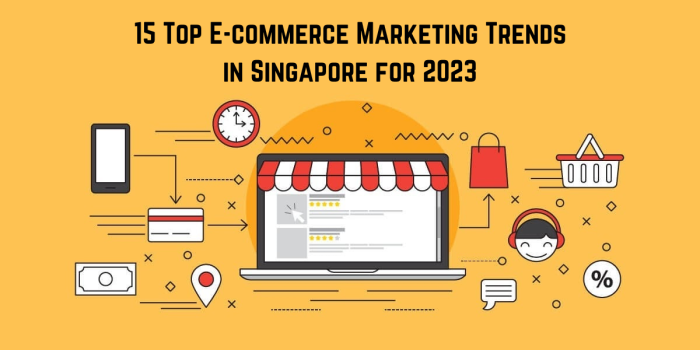
Even as the e-commerce market shifts, Singaporeans continue to be early adopters of new technologies. Several new developments in the industry will affect how e-commerce website design in Singapore approaches online marketing in the year 2023. This blog intends to offer a comprehensive evaluation of the top 15 e-commerce marketing trends in Singapore for 2023, covering everything from the use of technologies powered by AI to personalised marketing strategies.de excellent customer experiences in the competitive Singaporean industry through 2023 and further afield.
1. Combining Machine Learning (ML) and Artificial Intelligence (AI):
E-commerce marketing plans now commonly include the use of AI and ML technology. Singaporean companies are rapidly using AI-powered customization, chatbots, recommendation engines, & advanced data analytics tools to better serve their customers and increase sales.
2. Hyper-Personalization to Improve Client Experiences:
If you want to succeed in e-commerce web design Singapore, you need to personalise your marketing strategies for each customer. In order to increase customer pleasure and loyalty, firms in Singapore are using sophisticated segmentation & dynamic content distribution based on collected consumer data.
3. Optimising Voice Search:
Amazon Alexa and Google Assistant, two examples of voice assistants, have seen explosive growth in Singapore. Businesses in the e-commerce sector are adapting their sites as well as their content to make the use of voice search a more natural experience for customers.
4. Marketing Approaches Based on Influencers:
When it comes to promoting online stores in Singapore, influencer advertising is more important than ever. To increase brand exposure and revenue in specific regions, companies are forming partnerships with local influencers. Because of their genuineness and knack for appealing to a specific audience, micro-influencers are gaining popularity.
5. The Growth of Social Commerce:
Strong e-commerce web development in Singapore is emerging on social media sites. Singaporean companies are using social commerce tactics to take advantage of the growing popularity of social media retail sites like Instagram Shopping & Facebook Marketplace.
6. Virtual and Augmented Reality (VR) Encounters:
Users of augmented and virtual reality systems can have truly thrilling experiences. Online retailers in Singapore are increasing sales and decreasing returns by using augmented and virtual reality to improve product visualisation and give buyers a chance to visually try items before buying.
7. Mobile Optimisation and Progressive Web Apps (PWA):
Mobile optimisation is crucial because of Singapore’s high smartphone adoption rate. In order to increase user engagement & conversion rates, e-commerce companies are prioritising the development of responsive websites and investing in Progressive Web Apps (PWA).
8. UGC (User-Generated Content) and Social Proof:
Singaporean consumers place a premium on referrals from friends and colleagues. User-generated content (UGC), including reviews, ratings, and comments, is being included by e-commerce enterprises to increase credibility, trust, and sales.
9. Strategies for Omnichannel Marketing:
Online retailers in Singapore are using omnichannel marketing strategies to unify customers’ experiences across all sales channels. In order to enhance sales & customer loyalty, firms should integrate both online and offline touch points to better engage clients throughout the whole buying process.
10. Online Shopping with Subscriptions:
In Singapore, subscription-based online business models are flourishing. Businesses can increase client lifetime value and loyalty by providing customers with tailored product suggestions and the option for automatic shipment replenishment.
11. Social and Environmental Responsibility:
Sustainable as well as socially responsible business practises are rising in importance among Singaporean consumers. To appeal to the growing number of socially concerned consumers, several online retailers are implementing green policies, ethical sourcing, and open supply chains.
12. Video with Buyable Content:
The most popular way to spend time online now is watching videos. Singaporean e-commerce sites are capitalising on “shoppable” video to give customers a more streamlined and engaging purchasing experience.
13. Multilingual and Localised Advertising:
Singaporean society embraces diversity and speaks a variety of languages. Localised content, multilingual customer service, and regionally specific payment methods are just a few examples of how e-commerce enterprises are adapting their marketing strategies to meet the needs of a wide range of customers.
14. Uses for Social Message Apps in Creating Engaged Customers:
WhatsApp, WeChat, and Telegram are some of the most popular messaging platforms in Singapore. Online retailers are increasing customer loyalty and retention by using these tools to offer individualised assistance, make relevant product suggestions, and streamline the purchasing process.
15. Safeguards for Confidential Data:
Ecommerce website designing companies in Singapore are putting a premium on data protection due to rising privacy concerns. Businesses can earn their consumers’ trust by doing things like adhering to the Personal Data Protection Act (PDPA) and utilising stringent security measures.
Conclusion:
Technology, shifting consumer preferences, and fierce market competition are all contributing to rapid change in Singapore’s e-commerce environment. The above-mentioned top 15 e-commerce marketing trends will help firms drive growth and provide excellent customer experiences in the competitive Singaporean industry through 2023 and further afield.